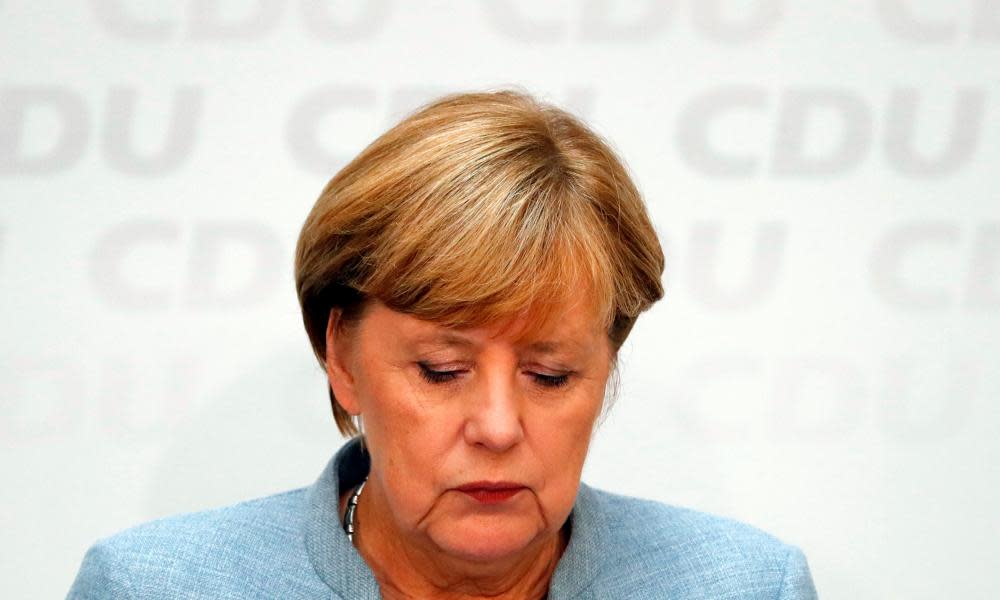German elections left Merkel isolated, but it is too soon to write her off | Philip Oltermann

Since Angela Merkel was first voted chancellor 12 years ago, political power in the hands of Germany’s first physicist-turned-politician has always looked more like a solid than a liquid.
“Power is the ability to shape things,” the chancellor said at the Christian Democrats’ headquarters on Monday afternoon, having just reminded assembled journalists that in spite of its worst election result since 1949, her party would still be the most powerful group in the next Bundestag. “And I like shaping things,” she added.
But in the 24 hours since Germans went to the polls, Merkel has also had a taste of just how quickly power can drain away once someone has found a way to pull the plug.
Having expected to find herself in a position where she could have her pick from a range of options for her next coalition government, the chancellor suddenly looks isolated, surrounded by sceptics she needs to actively talk round rather than eager wannabe allies.
Social Democrat leader Martin Schulz ruled out another “grand coalition” with the CDU within hours of the first exit polls, forcing Merkel to go begging for a second chance: on Monday the chancellor said she would like to “keep talking” with the SPD.
If Merkel wants to avoid a minority government or fresh elections, her only option is a “Jamaica” coalition with the Green party and the pro-business FDP. The former have updated their relationship status to “it’s complicated” (as Green party candidate Katrin Göring-Eckardt described it), while the latter are on the verge of sounding dismissive. “Whoever goes to bed with this chancellor cannot expect to wake up in it,” the FDP’s Thüringia leader Thomas Kemmerich said the day after the vote.
Even Bavaria’s CSU, allied to the Christian Democrats since 1949, on Monday morning briefly questioned whether the two parties should continue to run in tandem. In a Jamaica coalition, the arch-conservative Bavarian sister party would find itself the smallest party in a ménage à quatre.
The changed dynamic was already on display at the CDU’s HQ on Sunday night. At the last election in 2013, Merkel had taken centre stage to standing ovations. But this year she spoke only a few sentences before disappearing behind the broad shoulders of Joachim Herrmann, Bavaria’s bullish interior minister, who rallied the party faithful in broad south German vernacular.
After Sunday night, Merkel’s mythical status as the last-standing “leader of the west” suddenly looks a lot less unassailable, and the extent to which governments in London and elsewhere have built their diplomatic strategies around her persona seems naive.
Both the FDP and the Greens will demand concessions from the CDU in exchange for their support in government, some of which are likely to run counter to Emmanuel Macron’s ideas for reforming the eurozone. FDP leader Christian Lindner has already announced bold plans to make it easier for states to leave the eurozone without leaving the EU.
The strategy behind Merkel’s 2017 campaign may not have been as cartoonishly robotic as Theresa May’s incantation of “strong and stable” leadership, but its central message was the same: in the past, the German chancellor always convincingly came across as the unflappable leader who kept her head while those around her lost theirs.
Already in the hours since Sunday night’s result, however, some have begun to ask whether Merkel’s image as the only grownup in the room will be enough to fend off 94 noisy and aggressive Alternative für Deutschland delegates in the new parliament. “Sometimes seeming winners can also be dramatic losers,” wrote the weekly Die Zeit on Monday, usually a reliable defender of the chancellor’s course.
“She has lost an instinct for what people care about – if she ever had it in the first place: rising rents, insufficient wages, too many refugees and migrants, a great feeling of insecurity in a world which seems to have been turned upside down,” it said.
To declare Sunday night’s result the beginning of the end of Merkel could be premature, however – not least because there is a lack of candidates behind her who look more equipped to tackle the same challenges. Her supporters point out that Germany’s chancellor found herself in a not dissimilar situation when she was first elected in 2006.
Then, as now, Merkel saw an emphatic majority in the polls wither away over the course of a lacklustre election campaign and ended up with a result that almost matched the CDU’s worst since 1949. Merkel kept her calm, forged a coalition, and the rest is history.

 Yahoo News
Yahoo News 
